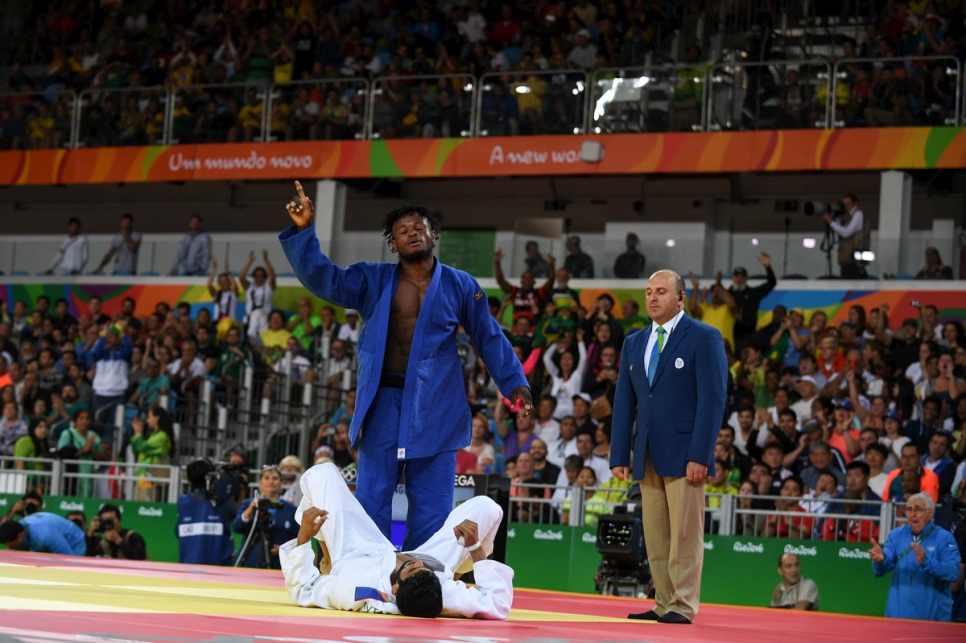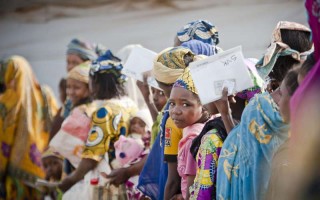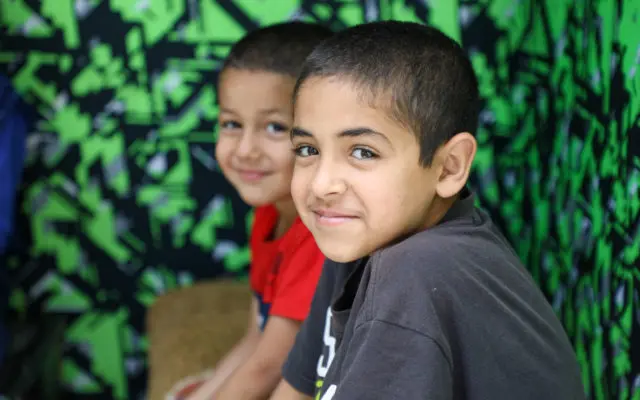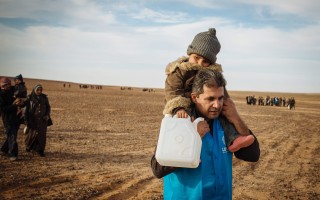
Popole Misenga celebrates the first-ever win of a refugee athlete in the Olympic Games. © UNHCR/Benjamin Loyseau
Congolese judoka wins hearts among fellow refugees and Brazilians with tough story of triumph over adversity.
RIO DE JANEIRO, Brazil – When Popole Misenga’s image appeared on the giant television screen, the waiting crowd exploded in delight.
Shouts, songs and chants of support pierced the heavy morning air of downtown Rio de Janeiro.
“Go Popole, go Popole,” they chanted in unison.
It was a sight the audience at the community centre could barely believe they were witnessing: a fellow Congolese refugee now, like them, living in Brazil competing in the Olympic Games, the pinnacle of sporting achievement.
Throughout his life, Popole has defied the odds.
For them, he could already do no wrong. His participation alone was gold. But throughout his life the 24-year-old from Democratic Republic of the Congo has defied the odds. He was determined to do it again. This party was far from over.
Smartly dressed in a blue judo toga, he bowed to his fellow competitor, India’s more experienced Avtar Singh. An uneasy quiet briefly fell over the audience.
As the bout got underway and Popole successfully evaded his wily opponent’s attempts to gain the upper hand, excitement bubbled afresh and the noise rose to a crescendo.
Suddenly in a swirl of twists and turns, it was over. Popole had won. The crowd went wild. Children danced, women wept and ululated, men banged drums and hugged each other.
“I am not happy, I am overjoyed,” said Christine Kamba, a young mother who only arrived in Brazil 10 months ago. “I know him, we all know him. He is our friend. He is fighting for us all.”
Popole, originally from the conflict-ridden east of the Democratic Republic of Congo, had in fact only won through to the next round, and would be eliminated in his next fight when he found himself in front of the world champion, but he had made history.
“I thought that nobody would cheer me. Then I saw that the whole of Brazil was supporting me. I got emotional. I felt something coming from inside: I needed to win that first fight. And I won,” he told UNHCR afterwards.
In fact, he had made history twice in one week. Once, as a member of the first refugee team ever to participate in an Olympic Games. Second, as the first refugee Olympian to progress beyond the first round.
“On the second fight, I confronted the world champion. But I will be back after the Games in order to get a medal. I will come after this champion and win him,” he added, before vowing to keep training: “I’m very happy. My name is already on the history of these Games. I want to compete more. I won’t stop.”
Most in the centre have had little to cheer in recent times. They have fled conflict and persecution to an unknown future, lost family and friends and, sometimes, hope. Like refugees and others all around the world, they have taken the Refugee Olympic Team into their hearts.
The 10-member team, put together by the International Olympic Committee with the support of the UN Refugee Agency, UNHCR, has won admirers across the world – not just for giving unrepresented people a chance at the highest level, but as a symbol of hope and triumph over adversity.
Popole and his compatriot Yolande Mabika, who had fought earlier but lost her bout, were especially important to this crowd. Most of the 1,000 or so Congolese refugees in Rio de Janeiro have passed through this support centre, which is run by UNHCR’s implementing partner, Caritas.
“They all have problems of adjustment, language and trauma, and we help them as best we can. We support their basic needs and help them get back on their feet,” said Caritas organizer Diogo Felix.
In 2013, Yolande and Popole came together to Rio to compete at the World Judo Championship. Their coach confiscated their passports and gave them limited access to food – as he did at every competition abroad.
Fed up with years of abuse, they fled the hotel together and wandered the streets searching for help. They ended up at this centre. Here they found friends and support and their lives slowly started again.
“Here we are all one. They fought for us today and for all refugees. They showed what can be done,” said Charly Kongo, 35, who was one of the first Congolese to arrive at the centre eight years ago. He now works in a local hotel. “Life has been tough, but Caritas and UNHCR have helped me get back on my feet.”
Popole is also popular with Brazilians. Many poor youths identify with his story. He moved people when he broke down in tears at an earlier press conference, recalling that he had not seen his immediate family for more than 18 years – not since he was separated from them by war and hid alone in a forest for eight days.
Coach Geraldo Bernardes, who also coaches the Brazilian team, said he was proud to be involved in helping the refugee team.
“He left the arena with a medal in his chest. And I gained a golden medal, a social golden medal in my chest… Brazil is giving an example, in this Games, on how to receive people that have suffered a lot and are facing inequalities,” he said.





